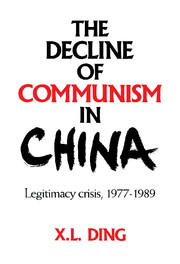Book contents
- Frontmatter
- Contents
- List of tables and figure
- Preface
- List of abbreviations
- Introduction
- Part I
- Part II
- 3 The movement to “emancipate the mind” and the counterelite's response
- 4 “Building socialist spiritual civilization” and the counterelite's response
- 5 Two contending patriotic campaigns
- 6 Admission of the “primary stage of socialism” and the counterelite's two developmental models
- Concluding remarks
- Appendix: Notes on methods and methodology
- Selected bibliography
- Index
5 - Two contending patriotic campaigns
Published online by Cambridge University Press: 17 September 2009
- Frontmatter
- Contents
- List of tables and figure
- Preface
- List of abbreviations
- Introduction
- Part I
- Part II
- 3 The movement to “emancipate the mind” and the counterelite's response
- 4 “Building socialist spiritual civilization” and the counterelite's response
- 5 Two contending patriotic campaigns
- 6 Admission of the “primary stage of socialism” and the counterelite's two developmental models
- Concluding remarks
- Appendix: Notes on methods and methodology
- Selected bibliography
- Index
Summary
This chapter is about patriotism as a two-edged sword in the politics of legitimation in post-Mao China. We shall see, on the one hand, how the Communist ruling elite made an appeal to patriotism in the hope of bolstering popular support for the regime. We shall also see how the counterelite appealed to patriotism in an attempt to mobilize popular resentment against the regime. The ruling elite's effort to appeal to patriotism was made necessary precisely because there had already been a crisis of confidence in the Communist system, and the government's socialist-moral appeal had failed to produce positive results. But it turned out that patriotism, which had been the regime's strong legitimating instrument, became in the hands of the counterelite a powerful tool for criticism of, and protest against, the Communist regime.
Background: the failure of the regime's earlier legitimation device
The Communist regime turned to patriotism in response to two sociopolitical shocks. One might be called the “Unrequited Love shock,” the other the “Fang Lizhi shock.” The first refers to middle-aged intellectuals' resentment and indignation as a result of their experience under Communist rule. A great number of them had been the Communist party's allies when it fought for survival during the Japanese invasion and the civil war in the 1930s and 1940s.
- Type
- Chapter
- Information
- The Decline of Communism in ChinaLegitimacy Crisis, 1977–1989, pp. 140 - 165Publisher: Cambridge University PressPrint publication year: 1994



